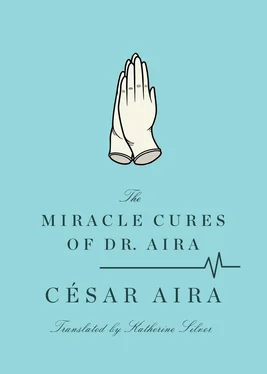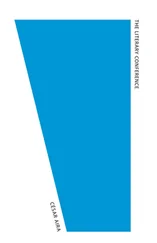He never stopped moving. He was bathed in sweat; it was streaming through his hair, and his clothes were stuck to his skin. He went back and forth, up and down, every cell in his body shaking, arms and legs stretching and contracting like rubber bands, and he was leaping around like an insect. His face, usually so inexpressive, churned like ocean waves during a storm, never pausing at any one expression; his lips formed all kinds of fleeting words, drowned out by the panting, and when they opened, his tongue appeared, twisting like an epileptic snake. If it had been possible to follow, with a stopwatch, the rising and falling of his eyebrows, one could have read millions of overlapping surprises. His gaze was fixed on his visions.
From the outside, and without knowing what any of it was about, the practice of the Cure looked like a dance without music or rhythm, a kind of gymnastic dance, which might appear to be designed to shape a nonexistent specimen of the human. Admittedly, it was pretty demented. He looked like Don Quixote attacking his invisible enemies, except his sword was the bundle of metaphysical foldout screens and his opponent was the Universe.
Thud! He crashed into a chair and fell headfirst to the floor, both his legs shaking; the crown of his head left a round damp mark on the rug; but even down there he kept working: his right hand was tracing a large semicircle, placing a screen that divided up the joys and sorrows of Muslims; his left was pulling a little on another screen that had excluded too many apples. . Now he was on his feet again, lifting the white accordion of a vertical screen that was crossing levels of reality as it sorted through “latenesses” and “earlynesses”. .! And what looked like a tap dance meant to recover his balance was him hanging two screens that would exclude certain rickshaws and particular conversations. With his chest, his rear end, his knees, his shoulders, and head-butts, he corrected the positions, angles, and inclinations of the panels, enacting a true St. Vitus dance in the process. And to think that this grotesque puppet was creating a New Universe!
And so it went. One might have thought that the space of representation at his disposal was going to get overcrowded, that it was going to start to get difficult to keep inserting more screens. But this didn’t happen because the space wasn’t exactly the one of the representation but rather of reality itself. In this way, miniaturization led to its own amplification. Like in an individual big bang, space was being created, not getting filled, through the process, hence within each pom-pom an entire Universe was being formed.
In honor of reality, he had left the door to the balcony open. Through it long strips of screens were swept out into the heavens. He couldn’t even see what some of them were excluding, but he trusted that in any case they would leave at least one particularity in each arena on this side. As often happens with difficult jobs, a point came when the only thing that mattered was to finish. He almost lost interest in the results, because the result that included all the others was to finish what he had started. He had really had to dig in to find out how demanding the problem of Everything was, what brain-racking pressure it created. . Only by living it could he find out; all prior calculations or fantasies fell short. Even though he didn’t have the time, he fervently longed to return to human mode, which was so much more
relaxing because it gives license to do anything. Nevertheless, what he was doing was deeply human, and given the mechanism of automatic re-absorption the Cure enacted, his exhaustion approached rest; pressure, relaxation.
In fact, the hinges on the last panels of each screen began to get welded to the other screens whose last panels were nearby, and with this the process of exclusion and inclusion was concluding. These welds happened on their own, one after the other, in cascades of billions that burst the heart of a second, of the final seconds. This produced a greasy white spark in the black depth of the Night. It was something like a nightmare, that “schluik. .” Dr. Aira’s utter exhaustion also contributed to this sense of feverish delirium, for at the very end of his strength he felt nauseated, as if he were suffocating; his ears were ringing, and there were red spots in front of his eyes.
But the important thing was that the siege had been laid, and the new Universe had been formed, as unfathomably complex as the old Universe had been until then, but different, and just right for the cancer of that man in that bed to never have been. . The work of the Cure had been completed right in front of his own eyes, half-closed from fatigue; his arms fell to his sides, flaccid, his legs were barely able to hold him up; the room, which he was now seeing again, was waltzing before his dizzy eyes; and in it the patient’s bed, the spotlights, the cameramen, the nurses, the relatives. . The next time, he told himself in a state of exhaustion that rendered him idiotic, he would have to think up a machine that could spread out the screens for him. Compared with an automated system, more appropriate for the times in which he lived, the dance to which he had surrendered would seem like some kind of imperfect, handmade prehistoric Cure. But before thinking about an improbable second time, he had to wait for the results of this one.
It was a wait truly laden with unknowns. Already, when he witnessed the welds, and in the sudden passivity these allowed him after such dense, nonstop action, he perceived that with each “closure” the plausible had changed, only to change again with the next one; the closures, of course, didn’t just happen; they were cumulative until they had formed one definitive closure. It was an extreme case of “doing something with words.” The transposition of plausibles was vertiginous, and Dr. Aira had no way of knowing where things would stand in the end. That’s what mattered, when all was said and done.
It didn’t take long for him to find out. In fact, in the overdetermination of the present, waking up was accompanied by guffaws. . which was part of the nightmare, but on another level. Laughter was increasing around him, reordering and giving substance to the space of the bedroom, and from there to the house, the neighborhood, Buenos Aires, the world. He was the last to sort himself out and to understand what was happening; he knew himself and was resigned to such delays. In the meantime, the only thing he knew was that from that moment on whatever happened in reality depended on the angle some panel of the screen was hung, no matter how far-flung it was; for example, the one that had excluded from this new Universe of reality a bonfire, or the flying sparks of a bonfire, in the prehistory of the Maori people. . Amid the laughter, his eyes opened onto a New World, really truly new.
And in this new world, those present were laughing heartily; the cameramen were turning off their cameras and lowering them, revealing themselves as the two fake doctors from the ambulance on Bonifacio Street; and the patient, choking on his laughter, was sitting up in bed and pointing a finger at him, unable to speak because he was laughing so hard. . It was Actyn! That wretch. . Everything had been staged by him! Or at least that’s what he thought. The truth is that he wasn’t dying, he didn’t have cancer nor had he ever, and he wasn’t a very wealthy businessman. . The plausible had completely changed. Laughter was justified; happiness needed no other motive. After years of trying in vain, Actyn had managed to get Dr. Aira to commit the biggest blunder of his career, the definitive one. . And in reality it was: the blunder as the transformation of the plausible, that is, as a visible trace — the only one that could remain inscribed on memory — of the transformation of one Universe into another, and hence of the secret power of the Miracle Cure.
Читать дальше












